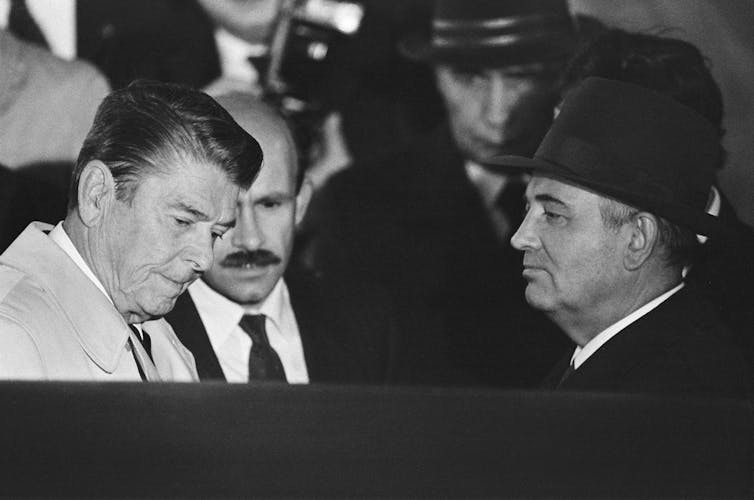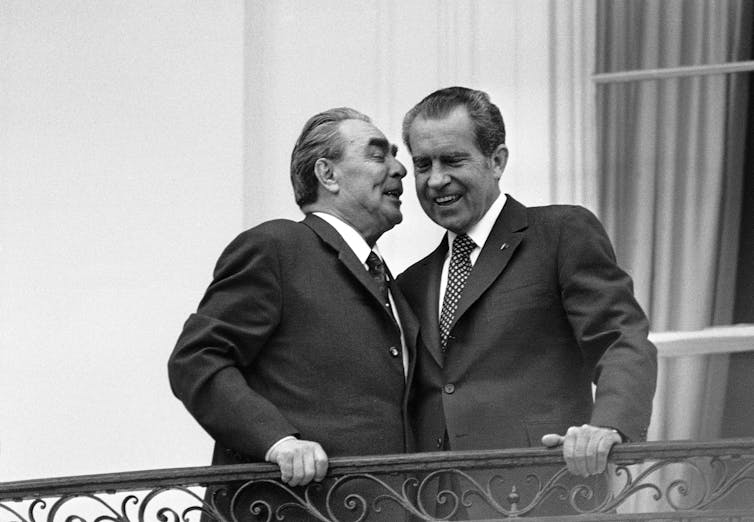Trump-Kim summit ends with no deal, but diplomacy is a long process
- Written by Tizoc Chavez, Lecturer, Department of Political Science, Vanderbilt University
A second summit between President Donald Trump and North Korean leader Kim Jong Un ended on Feb. 28 with no deal[1] on limiting North Korea’s nuclear weapons program.
“We had to walk away from that,” the president said[2].
The two leaders split over both the scope and pace of dismantling North Korea’s nuclear weapons program. Kim offered partial steps to curb his nuclear program in exchange for the complete lifting of sanctions by the United States. This was more than Trump was willing to give for only incremental progress.
I study the personal diplomacy[3] of world leaders, which is when heads of state and government directly engage through letters, phone calls and face-to-face meetings.
Though the summit broke up with no deal, based on my knowledge of past U.S. presidential summits[4], I know that talks that end without an agreement can still be important in laying the foundation for future progress.
Diplomacy is a long and laborious process. And even with preparation, summits aren’t guaranteed to succeed.
Reagan and Gorbachev
 U.S. President Ronald Reagan and Soviet President Mikhail Gorbachev have a few final words after a marathon meeting to conclude their mini-summit in Reykjavik Oct. 12, 1986.
REUTERS/Denis Paquin/File Photo[5]
U.S. President Ronald Reagan and Soviet President Mikhail Gorbachev have a few final words after a marathon meeting to conclude their mini-summit in Reykjavik Oct. 12, 1986.
REUTERS/Denis Paquin/File Photo[5]
In 1986, President Ronald Reagan met with Soviet leader Mikhail Gorbachev in Reykjavik, Iceland, to discuss arms control. During the talks, the two men proposed something radical[6]: Rather than simply limit intermediate-range nuclear missiles, they would eliminate all nuclear weapons.
But they disagreed over Reagan’s plan for a missile defense system in space, known as the Strategic Defense Initiative, or Star Wars. Gorbachev wanted research on the program relegated to the laboratory. Reagan refused.
As the two men departed, their slumped shoulders and despondent expressions[7] made their failure clear for all to see. The world’s print and television media captured the somber men as they went their separate ways.
But the situation wasn’t as dire as the post-summit body language suggested. Gorbachev actually came away from the meeting with optimism[8], believing that he and Reagan now had a firmer understanding of each other’s positions.
And though Reagan was initially disappointed, his advisers, including Secretary of State George Shultz, came to have a more positive outlook on the summit[9], helping Reagan see that the Soviets had moved closer to U.S. positions than ever before and truly wanted to make a deal.
It would take many more months of negotiations, but in December 1987 Reagan welcomed Gorbachev to Washington to sign an agreement eliminating both nation’s arsenals of intermediate-range nuclear weapons.
The deal didn’t go as far as the proposal in Reykjavik to abolish all nuclear weapons. But it was more than most imagined possible at the start of Reagan’s presidency, when in his first press conference[10] he questioned the Soviets’ morality, saying that they “reserve unto themselves the right to commit any crime, to lie, to cheat” to achieve their objectives.
Still a chance of progress
As Reagan’s experience shows, evaluating the second Trump-Kim summit will depend on what happens in the coming months.
At a Feb. 28 press conference[11], Trump said Kim “has a certain vision and it’s not exactly our vision but it’s a lot closer than it was a year ago.” And he continued to express confidence in Kim: “He’s quite a guy and quite a character. And I think our relationship is very strong.”
Though the summit didn’t have an ideal ending, the alternatives could be worse. As one expert on North Korea’s nuclear program said[12], a total breakdown of the Trump-Kim relationship would have been the worst-case scenario. Or, as some foreign policy analysts feared[13], the president might have agreed to a deal just to get a “win” to distract from his domestic troubles.
Summits have the potential to go wrong. In 1961, President John F. Kennedy met with Soviet leader Nikita Khrushchev in Vienna[14]. The result was worsening relations and heightened Cold War tensions.
 Soviet leader Leonid I. Brezhnev, left, whispers in the ear of President Richard M. Nixon as the two leaders stand on a balcony at the White House in Washington.
AP Photo/File[15]
Soviet leader Leonid I. Brezhnev, left, whispers in the ear of President Richard M. Nixon as the two leaders stand on a balcony at the White House in Washington.
AP Photo/File[15]
When President Richard Nixon met with Soviet leader Leonid Brezhnev at the height of the Watergate scandal, many worried[16] the president might make harmful concessions simply so he could claim “success” and redirect the nation’s attention. This didn’t happen, but it’s a reminder of the potential dangers involved in personal diplomacy.
Trump appears to have avoided both those scenarios.
Even without a deal, both sides seem committed to at least continue talking. And if negotiations continue at lower diplomatic levels and Kim refrains from conducting missile and nuclear tests (as Trump said he promised[17]), it’s possible that the two sides might come to a future agreement. Then perhaps the Hanoi summit will go down in history as an important stepping-stone.
Personal relationships versus national interests
The latest Trump-Kim summit shows that though leaders engage in personal diplomacy, what often determines success isn’t the personal element.
Personal chemistry between leaders can be beneficial and help lead to greater understanding. It helped Reagan and Gorbachev[18] in their search for an arms control agreement, allowing them to build trust and assess each other’s sincerity.
But as Nixon noted[19], though a personal bond with another leader might improve the chances of settling disputes, at the end of the day, “a smile or a handshake or an exchange of toasts or gifts or visits will not by themselves have effect where vital interests are concerned and where there are great differences.”
References
- ^ no deal (www.politico.com)
- ^ president said (www.vox.com)
- ^ personal diplomacy (books.google.com)
- ^ based on my knowledge of past U.S. presidential summits (etd.library.vanderbilt.edu)
- ^ REUTERS/Denis Paquin/File Photo (pictures.reuters.com)
- ^ proposed something radical (nsarchive2.gwu.edu)
- ^ slumped shoulders and despondent expressions (www.reaganlibrary.gov)
- ^ with optimism (nsarchive2.gwu.edu)
- ^ more positive outlook on the summit (books.google.com)
- ^ first press conference (www.presidency.ucsb.edu)
- ^ press conference (www.vox.com)
- ^ said (www.vox.com)
- ^ some foreign policy analysts feared (www.usatoday.com)
- ^ Vienna (books.google.com)
- ^ AP Photo/File (www.apimages.com)
- ^ many worried (books.google.com)
- ^ Trump said he promised (www.vox.com)
- ^ Reagan and Gorbachev (books.google.com)
- ^ Nixon noted (books.google.com)
Authors: Tizoc Chavez, Lecturer, Department of Political Science, Vanderbilt University
Read more http://theconversation.com/trump-kim-summit-ends-with-no-deal-but-diplomacy-is-a-long-process-112597

